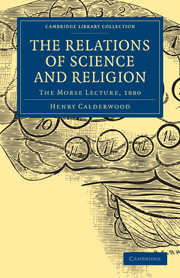Book contents
- Frontmatter
- EXTRACT FROM THE DEED OF TRUST, ESTABLISHING THE MORSE LECTURESHIP
- PREFACE
- Contents
- LECTURE I CONDITIONS OF THE INQUIRY
- LECTURE II EXPERIENCE GATHERED FROM PAST CONFLICTS
- LECTURE III INORGANIC ELEMENTS IN THE UNIVERSE
- LECTURE IV ORGANIZED EXISTENCE. LIFE AND ITS DEVELOPMENT
- LECTURE V RELATIONS OF LOWER AND HIGHER ORGANISMS
- LECTURE VI HIGHER ORGANISMS;—RESEMBLANCES AND CONTRASTS
- LECTURE VII MAN'S PLACE IN THE WORLD
- LECTURE VIII DIVINE INTERPOSITION FOR MORAL GOVERNMENT
- APPENDIX
LECTURE IV - ORGANIZED EXISTENCE. LIFE AND ITS DEVELOPMENT
Published online by Cambridge University Press: 05 October 2010
- Frontmatter
- EXTRACT FROM THE DEED OF TRUST, ESTABLISHING THE MORSE LECTURESHIP
- PREFACE
- Contents
- LECTURE I CONDITIONS OF THE INQUIRY
- LECTURE II EXPERIENCE GATHERED FROM PAST CONFLICTS
- LECTURE III INORGANIC ELEMENTS IN THE UNIVERSE
- LECTURE IV ORGANIZED EXISTENCE. LIFE AND ITS DEVELOPMENT
- LECTURE V RELATIONS OF LOWER AND HIGHER ORGANISMS
- LECTURE VI HIGHER ORGANISMS;—RESEMBLANCES AND CONTRASTS
- LECTURE VII MAN'S PLACE IN THE WORLD
- LECTURE VIII DIVINE INTERPOSITION FOR MORAL GOVERNMENT
- APPENDIX
Summary
IN prosecuting our inquiry as to the most recent advances in science, we pass now from inorganic to organic existence; from the testimony of physicists, to that of zoölogists. This transition in itself starts a scientific problem, beyond which we are carried onward to a distinct and very complicated area of existence, higher in order, and pressing upon attention an incalculable variety of details, exceedingly difficult to harmonize. In the earlier stage of physical research, all observation and experiment lead forward to general results, which gain ready acceptance because they may be said to be involved in scientific procedure itself. In this more advanced stage it is otherwise. In the former, unorganized matter is the same everywhere; and the laws of energy can be studied with equal facility in Europe or in America, in northern latitudes or in southern. But when we begin to direct attention upon life in its manifold forms, as these are scattered all over the world, multitudes of distinct observations have to be prosecuted, and their results slowly accumulated, before even the most competent workers can occupy a position from which it is possible to make a beginning with our forecast of general conclusions. Even in the most favorable circumstances, a great deal must be left to problematic inference, and even to imagination. Gatherings of facts may be recorded in a manner which places them beyond reach of doubt, while theories founded upon them hang long in suspense, waiting confirmation on condition of being able to endure protracted criticism, and manifold applications.
- Type
- Chapter
- Information
- The Relations of Science and ReligionThe Morse Lecture, 1880, pp. 119 - 161Publisher: Cambridge University PressPrint publication year: 2009First published in: 1881



